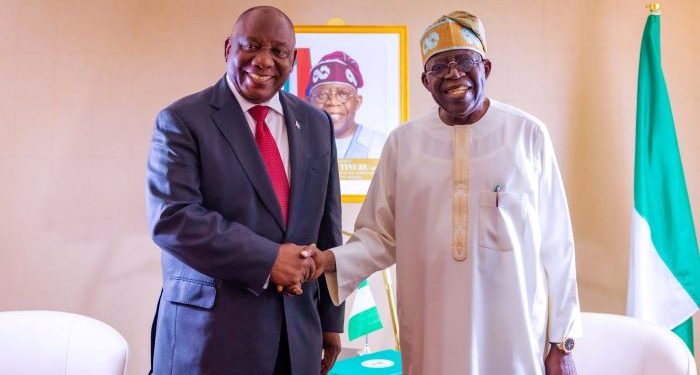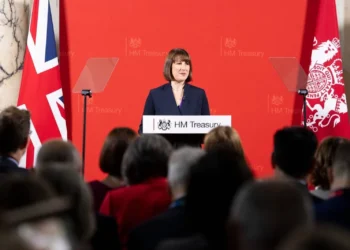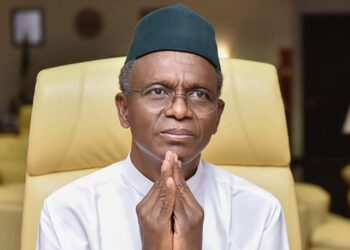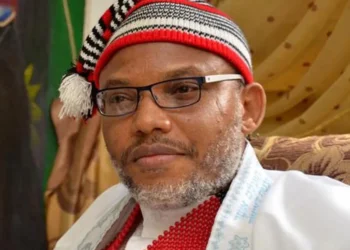In a momentous meeting on Monday, President Bola Tinubu engaged in bilateral talks with South African President, Cyril Ramaphosa, in New York City. The purpose of this meeting was to foster stronger economic ties between Africa’s two largest economies, Nigeria and South Africa.
This initiative comes as Africa seeks to leverage its enormous potential and resources on the global stage. Let’s delve into the details of their discussions and the potential implications for the continent.
A Push for African Development
President Tinubu wasted no time in emphasizing the importance of utilizing the resources available through International Development Finance Institutions like the IMF and World Bank, often referred to as the Bretton Woods Institutions.
He drew a parallel with the post-World War II Marshall Plan, which played a crucial role in the reconstruction and economic recovery of European nations. Tinubu stated:
- “During the end of the Second World War, the Marshall Plan was established for the reconstruction and economic restoration of European nations through Bretton Woods institutions. Where has this presence been in Africa? We have to be careful not to replace the broken shackle of yesterday with a new set of shackles. You cannot have a stable democracy in the presence of a poverty of knowledge and a starvation of people.”
Tinubu’s words resonate with the continent’s desire for development that aligns with its unique needs. He stressed that democracy alone is insufficient if it doesn’t address the economic well-being of the people. Africa, rich in human and natural resources, stands ready for investment and collaboration.
He further highlighted the potential for cooperation in specific sectors, such as Nigeria’s solid minerals development and South Africa’s expertise in mining. This synergy could result in job creation and mutually beneficial outcomes for both nations.
Strengthening Economic Ties
South African President Cyril Ramaphosa concurred with President Tinubu on the importance of deepening economic ties between the two nations. Both leaders acknowledged their roles as the major economies on the African continent, making collaboration essential, especially in light of the African Continental Free Trade Agreement.
Ramaphosa noted:
- “We are two major economies on our continent, and we must deepen economic ties, particularly in light of the African Continental Free Trade Agreement. We are very keen on the deepening of our economic relations. We would love to see Nigeria and South Africa working closely together on several issues because whenever we join hands, we have made an impact globally through those joint positions.”
He emphasized the historical exploitation of African resources by wealthier nations and called for partnerships that would advance the interests of African countries.
Ramaphosa extended an invitation to President Tinubu to visit South Africa, further strengthening the economic and diplomatic relationship between both countries.
The Broader Implications
The discussions between President Tinubu and President Ramaphosa hold significant implications for the entire African continent. Nigeria and South Africa, with their combined economic power, have the potential to shape the trajectory of Africa’s development and influence global agendas.
Their cooperation is pivotal in realizing the goals of the African Continental Free Trade Agreement, which aims to create a single market for goods and services across the continent.
President Tinubu’s presence at the 78th UN General Assembly underscores Africa’s commitment to engaging with the international community.
As part of his visit, he is expected to hold discussions with US President Joe Biden and other world and business leaders. These interactions may pave the way for increased international cooperation and investment in Africa’s burgeoning economies.
In conclusion, Africa’s two biggest GDPs, Nigeria and South Africa, are poised to strengthen economic ties, setting an example for the entire continent.
President Bola Tinubu’s meeting with President Cyril Ramaphosa signals a new era of collaboration and partnership.
As Africa seeks to leverage its vast potential, these discussions hold the promise of greater economic development and prosperity for the continent.
The world will be watching as Africa’s economic giants take bold steps towards a brighter future.
Can Nigeria’s New President Lead the Continent?
The question of whether Nigeria’s new President, Bola Tinubu, can lead the continent is a complex and multi-faceted one. As the leader of Africa’s most populous country and its largest economy, Tinubu carries a significant influence on the continent’s political and economic landscape.
His bilateral talks with South African President Cyril Ramaphosa indicate a willingness to foster economic cooperation and strengthen ties among African nations.
However, leading the entire continent requires more than just economic partnerships; it demands effective diplomacy, conflict resolution skills, and the ability to navigate the diverse interests and challenges that different African nations face.
Tinubu’s tenure as Nigeria’s president will be closely observed by the international community, as it coincides with a crucial period for Africa’s development and global engagement. His ability to forge alliances, promote peace and stability, and advocate for Africa’s interests on the global stage will ultimately determine his leadership legacy on the continent.
For any enquiries please, email our editorial team at [email protected]. If you liked this story, kindly sign up for Clariform Newsletter, a handpicked selection of stories that helps you clarify things that matter and gives you clear signals about your world, delivered directly to your inbox.
Please subscribe to our YouTube channel, and join thousands of Clariform on Facebook, Twitter and Instagram.












